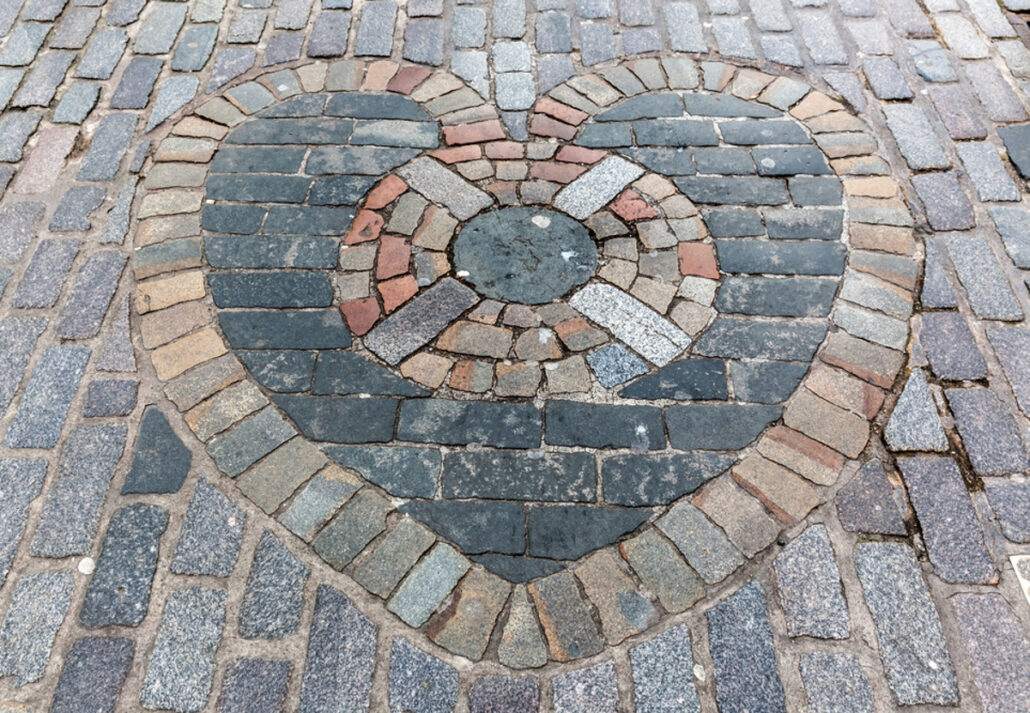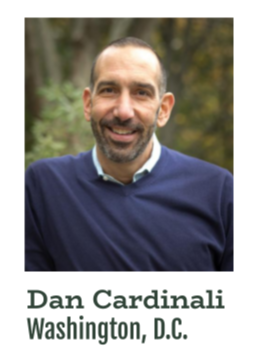See. Do. Be. Free.

Issue 025
An Open Letter to the Community around this year's theme.
Issue 025: Wholeheartedness – “Reflections on Wholeheartedness” by Dan Cardinali
As Street Psalms enters its 25th year of forming grassroots leaders in vulnerable communities, we are inviting friends of our work to reflect with us on their own sense of vocation and call. This month Dan Cardinali reflects on our guiding question:
When did your sense of vocation become real to you and what does it mean for you to show up wholeheartedly in your call when confronted with disappointment, failure, despair, and your own half-heartedness?
Almost a year ago, I stepped down from leading national, Washington, D.C.-based organizations after almost two decades of being a CEO. Then, as now, I was aware that I had been deeply blessed having worked with extraordinary people who took seriously their commitment to intentionally loving through their work, striving daily to love with their fullest selves. Then, as now, I was filled with gratitude for the blessings that had come to us through sometimes very challenging circumstances in laboring for a more loving and just world. I was tired, however, and ready to take a pause and reflect. And If I’m being honest, I was edging toward burnout. Aside from the clear insight that I was struggling to lead with a prayerful and discerning heart, the fact that I could not seem to reset and find that stream of Grace that had always been there for me was the alarm bell that it was time to retreat to the mountain.
I’m not a huge fan of the desolate and lonely mountain. I am an introvert who craves quiet and time alone for sure. But prayerful quiet has served me most often as a respite and sense-making space so that I could engage the many challenges and opportunities that seemed to flow endlessly at me. That wonderful Jesuit notion of “contemplative in action” worked really well for me, often serving as a source of consolation. However if I’m being honest, this Jesuit notion had subtly gotten distorted over time to a notion of a contemplative in service of activism. My activist disposition, coupled with the endless demands of a mission-driven organization, set the pace, prompted the questions, determined the circumstances, set the context for and contoured my prayer life. More subtly, my incarnational convictions of discipleship seemed to justify this shift.
During the year of discernment before stepping down as CEO, I began to allow contemplation to become my action. Barbara, my spiritual director, had been helping me pay attention to this invitation…an invitation to go up to the mountain with Jesus. And pray. So after I left my job, I made a commitment: devices were put down; emails remained unopened; colleagues’ requests for brainstorming an opportunity or challenge were deferred. Long walks in the woods and a renewed practice of meditation and Ignatian contemplation took root in my beloved early mornings. And a structured learning sabbatical with Theologian James Alison helped me mine the many, many Graces from the Holy Spirit’s handiwork over the years.
This time was at once full of blessings and quite challenging. Bringing myself with honest compassion into silent prayer is simply one of the most challenging activities I have ever done. And even with the greatly reduced distractions of the world, I found it nearly impossible to ignore the fact that we live in an extremely intense time of constant and accelerating change. Overlay the illusion that technology creates, that we’re in the flow of that change, and somehow, our constant attention to it is a proxy for doing something about it, and you’ve got a highly toxic and addictive drug. As I struggled to stay on the mountain, I became so aware of just how unending and historically unprecedented the competition is for our attention. And for one who finds deep, humanizing joy in being in the scrum of life’s challenges, the intentional action of slowing down and deeply listening was (and continues to be) humbling and difficult.
The hardest part for me was to confront a dramatic shift in my prayer life. The Holy Spirit’s invitation on the mountain asked me to show up differently, to pray differently, and to ultimately surrender the security of my spiritual practices without a clear sense of what would replace them. Once the demands to respond to the world began to diminish as the force directing my prayer…an unnerving silence began to set in. And when silence does not prompt immediate action, or any action at all, existential anxiety can well up quite ominously.
Unlike Peter, James, and John, whose transformative experience with Jesus during the Transfiguration dramatically reoriented their lives, I found myself facing deepening quiet, dramatically diminished activity, a persistent sense of the world on fire, and a paradoxical vocational call to sit and listen and dive headlong into the fray. Slowly, and I believe still very nascently, I have begun to experience a reorientation. While accepting my disappointment from not feeling the disciples’ zeal at the Transfiguration, I’ve begun to allow action to flow from contemplation. Simple to write here, but the daily practice and challenge to cultivate and sustain this invitation to be in relationship with God in this way is humbling and slow going.
So when I think of wholeheartedness, I am struck by just how dramatically I’ve shifted in my experience and understanding of this. Before my most recent journey to the mountain, I thought of my desire to live wholeheartedly as powered by contemplation in service of action. Authentic discipleship, animated by prayer, was about directly responding to human suffering while struggling to rework public and private institutions to foster a more just and humanizing community. My intentions for living this way were as earnest as one can be living in our crazy modern world, with my own unique mix of deeply complex motivations, myriad selfish distractions, and a sincere and prayerful attempt to live an authentic Christian discipleship. In the end, wholeheartedness meant intentional action…with a lot of emphasis on action!
Currently, I find myself shifting when I think of what it means to be wholehearted. Action that flows from contemplation just feels different. Listening first and struggling to feel and hear the Holy Spirit’s whispers as the prompting action is increasingly becoming my posture. Whereas before, primacy was placed on the whirling demands of the world to center my prayer, now (or shall I say increasingly) primacy is placed on silence; on settling into quiet; on a posture of listening; and a request for patience. Eventually, action flows from this silence, an action that is notably less frenetic, less transactional in engaging others, and less goal directed in its outcomes. Not surprisingly, applying the same word of wholeheartedness to this shift in prayer feels strange…like the terms are too distant to be related.
I would mislead if I conveyed a sense that all is settled, that sweetness and light abound, that my inclination to enthusiastically jump into the scrum of life as my first response has given way to a Zen-like centeredness. Rather, I take great consolation in St Ignatius’ formulation of the First Principle and Foundation in the Spiritual Exercises:
God created human beings to praise, reverence, and serve God, and by doing this, to save their souls.
God created all other things on the face of the earth to help fulfill this purpose.
From this it follows that we are to use the things of this world only to the extent that they help us to this end, and we ought to rid ourselves of the things of this world to the extent that they get in the way of this end.
For this it is necessary to make ourselves indifferent to all created things as much as we are able, so that we do not necessarily want health rather than sickness, riches rather than poverty, honor rather than dishonor, a long rather than a short life, and so in all the rest, so that we ultimately desire and choose only what is most conducive for us to the end for which God created us.
So wholeheartedness these days is about asking for the grace to choose only what is most conducive for us to the end for which God created us. Wholeheartedness is returning over and over again to a wholehearted listening while fighting the temptation to allow action to be the highest indicia of God’s Reign. Wholeheartedness is asking for the grace of indifference so that organizational efficiencies don’t become proxies for goodness; so that lovingly honest and humanizing relationships aren’t subordinated to transactional relations in service of organizational or personal impact; so that high impact strategies are not substituted for attentive spiritual discernment.
False humility aside, I fail more than I succeed at living into this new kind of wholeheartedness. Progress these days is noted in diminished self-reproach as I struggle onward. I take solace in that I increasingly catch myself from falling back into old patterns.
So each morning I will step into the uncomfortable, Grace-filled silence and listen as wholeheartedly as I can, trusting a little bit more that this is my most important action of the day.
Dan Cardinali brings a wealth of experience from the nonprofit world. Among other things, he currently serves as the Board Chair of the Fetzer Institute. He recently served as president and CEO of Independent Sector, the only national membership organization that brings together nonprofits, foundations, and corporations seeking to advance the common good. Before joining IS in 2016, Dan served on the IS Board of Directors and led Communities In Schools, the nation’s largest and most effective dropout prevention organization, for 12 years. Early in his career, Dan was a community organizer in Guadalajara, Mexico, working with faith-based communities while studying social analysis. He holds a bachelor’s degree in international relations from Georgetown University School of Foreign Service and a master’s degree in philosophy from Fordham University. You can learn more about Dan on his LinkedIn page.

